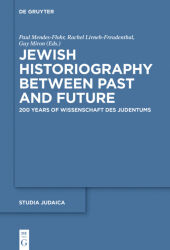 Neuerscheinungen 2019Stand: 2020-02-01 |
Schnellsuche
ISBN/Stichwort/Autor
|
Herderstraße 10
10625 Berlin
Tel.: 030 315 714 16
Fax 030 315 714 14
info@buchspektrum.de |

Rachel Livne-Freudenthal, Paul Mendes-Flohr, Guy Miron
(Beteiligte)
Jewish Historiography Between Past and Future
200 Years of Wissenschaft des Judentums
Herausgegeben von Mendes-Flohr, Paul; Livne-Freudenthal, Rachel; Miron, Guy
2019. VI, 215 S. 16 b/w and 3 col. ill. 230 mm
Verlag/Jahr: DE GRUYTER 2019
ISBN: 3-11-055354-6 (3110553546)
Neue ISBN: 978-3-11-055354-3 (9783110553543)
Preis und Lieferzeit: Bitte klicken
Nach dem Zweiten Weltkrieg hat Ernst Ludwig Ehrlich (1921-2007) herausragende israelische Gelehrte in englisch- und deutschsprachigen Veröffentlichungen in Europa und Nordamerika bekannt gemacht. Die zu diesem Zweck von ihm begründete Reihe Studia Judaica bietet heute ein Forum für wissenschaftliche Studien und Editionen aus allen Epochen der jüdischen Religionsgeschichte.
After World War II, Ernst Ludwig Ehrlich (1921-2007) published works in English and German by eminent Israeli scholars, in this way introducing them to a wider audience in Europe and North America. The series he founded for that purpose, Studia Judaica, continues to offer a platform for scholarly studies and editions that cover all eras in the history of the Jewish religion.
From its modest beginnings in 1818 Berlin, Wissenschaft des Judentums has burgeoned into a scholarly discipline pursued by a vast cadre of scholars. Now constituting a global community, these scholars continue to draw their inspiration from the determined pioneers of Wissenschaft des Judentums in nineteenth and twentieth Germany. Beyond setting the highest standards of philological and historiographical research, German Wissenschaft des Judentums had a seminal role in creating modern Jewish discourse in which cultural memory supplemented traditional Jewish learning. The secular character of modern Jewish Studies, initially pursued largely in German and subsequently in other vernacular languages (e.g. French, Dutch, Italian, modern Hebrew, Russian), greatly facilitated an exchange with non-Jewish scholars, and thereby encouraging mutual understanding and respect. The present volume is based on papers delivered at a conference, sponsored by the Leo Baeck Institute in Jerusalem, by scholars from North American, Europe, and Israel. The papers and attendant deliberations explored ramified historical and methodological issues. Taken as a whole, the volume represents a tribute to the two hundred year legacy of Wissenschaft des Judentums and its singular contribution to not only modern Jewish self-understand but also to the unfolding of humanistic cultural discourse.
Paul Mendes-Flohr, The University of Chicago Divinity School.


